Scott's Victory Lap: Gov Wins Third Term, Gray Elected LG, Speaker Johnson Falls Short
by Paul Heintz

- Screenshot ©️ Seven Days
- Gov. Phil Scott declares victory Tuesday in a video shot in his motorcycle garage.
Republican Gov. Phil Scott waltzed to a third term on Tuesday, while Democratic newcomer Molly Gray was elected Vermont’s fourth female lieutenant governor.
And in the upset of the evening, House Speaker Mitzi Johnson (D-South Hero) appeared headed for defeat. Unofficial results showed Rep. Leland Morgan (R-Milton) and his nephew, fellow Milton Republican Michael Morgan, ahead in the two-seat House district — with Johnson trailing 18 votes behind the latter. Given the narrow margin, Johnson declined to concede on Tuesday night and said she would seek a recount.
“It’s not uncommon for Vermont House elections to be extremely close,” she said in a written statement. “Over the years, we’ve seen tight races and recounts in this district. I want to ensure every vote is counted and that we have clarity on the outcome of this election.”
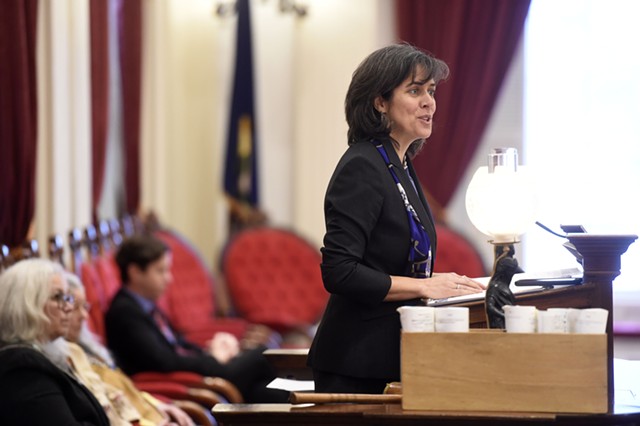
- File: Jeb Wallace-Brodeur
- House Speaker Mitzi Johnson (D-South Hero)
Though the outcome of the presidential election remained unclear early Wednesday, the preference of Vermonters was readily apparent. Preliminary results showed Democratic former vice president Joe Biden leading Republican President Donald Trump 66 to 30 percent. That’s a wider margin than in 2016, when Democratic nominee Hillary Clinton led Trump 56 to 30 percent, with 6 percent writing in Sen. Bernie Sanders (I-Vt.).
Scott, 62, appeared to have won the biggest victory of his three runs for governor. As of Wednesday morning, he was leading his Progressive/Democratic challenger, Lt. Gov. David Zuckerman, 67 to 27 percent — a margin of 40 percentage points.
Gray, meanwhile, claimed nearly 50 percent of the vote in her first electoral outing, while her Republican opponent, Scott Milne, picked up 42 percent.
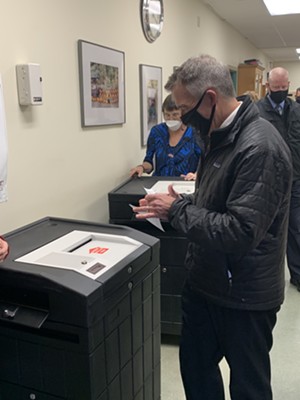
- Paul Heintz ©️ Seven Days
- Gov. Scott voting Tuesday in Berlin
The two-term governor and former construction executive acknowledged that his victory had come during “some of the greatest challenges of our lifetime.” He pointed to the coronavirus pandemic, which has ravaged the nation and recently resurged in Vermont, as well as the country’s partisan divide.
“Our nation is hurting — not just from COVID-19 but because of another virus that has infected the hearts and minds of too many Americans: that of hate, fear and division,” Scott said. “We must confront this with the same force and energy we’re putting toward the coronavirus.”
Scott, who barely campaigned for a third term, staked his reelection race on the state’s response to the pandemic — as well as his own distinctive brand of moderate Republican politics. After voting in the Berlin town offices Tuesday afternoon, he disclosed that he had cast a ballot for Biden over Trump, becoming the only incumbent Republican governor to do so.
“I put country over party,” Scott explained.
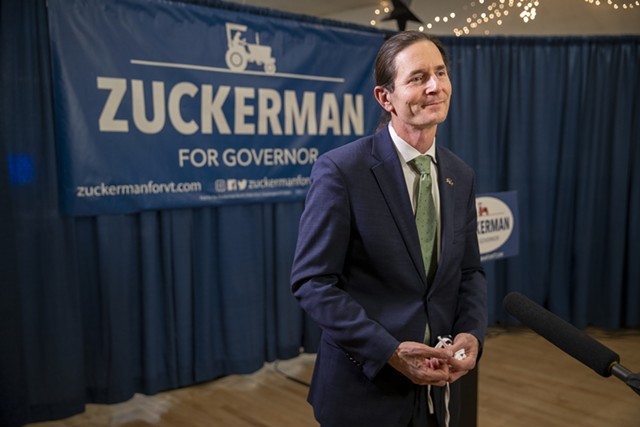
- James Buck
- Lt. Gov. David Zuckerman at his election night party in Burlington
The race for lieutenant governor pitted two lesser-known figures against one another in the most competitive state contest of the year. Gray, a 36-year-old assistant attorney general from Burlington, had promised to fight for greater access to broadband, affordable childcare and paid family leave. Milne, a 61-year-old travel executive from Pomfret, said he would work to help small businesses recover from the effects of COVID-19.
Milne ran for governor in 2014, nearly toppling Democratic incumbent Peter Shumlin, and unsuccessfully challenged Sen. Patrick Leahy (D-Vt.) in 2016.
Gray declared victory Tuesday night at the Great Northern restaurant and bar in Burlington.
“We’ve led in responding to the pandemic, but now it’s time to lead in responding to the climate crisis,” she said. “We can also lead in rooting out systemic racism wherever it exists, addressing poverty and social injustice — but we have to get it right. To quote the late justice Ruth Bader Ginsberg, we must fight in a way that brings other people to the table. We have to fight in a way that brings others to join us.”

- Luke Awtry
- Molly Gray on Tuesday night in Burlington
“Our next generation is here, and we are ready to lead,” she said. “Together I know we can take Vermont forward. I also know we can be an example for the nation for how to come together, work together, put divisiveness aside and succeed together.”
The race for lieutenant governor grew nasty at times, with both candidates accusing the other of drawing support from shadowy outside organizations. Milne’s campaign was particularly aggressive, questioning whether Gray’s 15 months living in Switzerland in 2017 and 2018 made her constitutionally ineligible to serve as LG — and repeatedly highlighting her spotty voting record.
In her victory speech Tuesday, Gray criticized her opponent for pushing “misleading and nasty personal attacks” and called his negative television advertisements “an attempt to buy an election, destroy my reputation and diminish my integrity.”
Milne did not address the public Tuesday night but called Gray shortly after her speech to concede. “I am honored by the tens of thousands of Vermonters who supported my candidacy,” he said in a written statement. “I send my sincere congratulations to Molly Gray on her victory this evening. I wish her success moving forward.”

- Jeb Wallace-Brodeur
- Scott Milne and Molly Gray debate during their campaign for lieutenant governor.
Across Lake Champlain in New York’s 21st congressional district, U.S. Rep. Elise Stefanik (R-N.Y.) easily fended off second-time Democratic challenger Tedra Cobb, 64 to 36 percent.
Vermont saw little competition in most of its statewide races. Democratic state Treasurer Beth Pearce defeated her Republican challenger, former state legislator Carolyn Whitney Branagan, 54 to 31 percent, according to preliminary results. Democratic Secretary of State Jim Condos, Democratic Attorney General T.J. Donovan and Democratic/Progressive Auditor Doug Hoffer faced only token opposition from perennial candidates.
Speaker Johnson was not the only state legislative leader to lose her seat Wednesday night. Rep. Robin Chestnut-Tangerman (P-Middletown Springs), who heads the House Progressive Caucus, was felled by Republican Sally Achey, also of Middletown Springs. Achey picked up 1,417 votes, while Chestnut-Tangerman collected 1,385.
Those losses did not appear likely to dramatically shift the balance of power in the Vermont House, which has been firmly in the grasp of Democrats and Progressives in recent years.
In the Senate, Republicans were poised to pick up one seat. But Democrats and Progressive seemed certain to hold 23 of 30 seats.
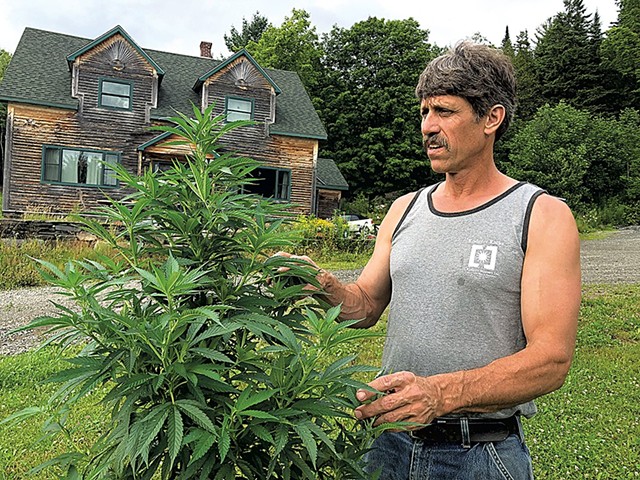
- File: Alicia Freese ©️ Seven Days
- Sen. John Rodgers with a hemp plant
Preliminary results showed Rodgers trailing fellow incumbent Sen. Bobby Starr (D-Essex-Orleans), Republican Russ Ingalls, Republican Jonathan Morin and Democrat Ron Horton in the two-member district. Starr claimed 8,668 votes, Ingalls 7,734 — and Rodgers a distant 5,100.
The Senate will also include two new members from populous Chittenden County.
Kesha Ram, a Democrat from Burlington, and Thomas Chittenden, a Democrat from South Burlington, will join four incumbents in representing the six-member district: Sens. Ginny Lyons (D-Chittenden), Michael Sirotkin (D-Chittenden), Phil Baruth (D/P-Chittenden) and Chris Pearson (P/D-Chittenden). Seven others, including six Republicans, also ran in the district.
Ram, a former state representative who unsuccessfully ran for lieutenant governor in 2016, will be the first woman of color to serve in the Vermont Senate. She and Chittenden will replace Ashe and Ingram, both of whom gave up their seats to run in the Democratic primary for lieutenant governor.
The retirement of Sen. James McNeil (R-Rutland), triggered a 10-candidate contest for Rutland County’s three-seat Senate district. The two other incumbents, Sen. Brian Collamore (R-Rutland) and Sen. Cheryl Hooker (D-Rutland) both won reelection. Republican Joshua Terenzini won the third seat.
Other than Johnson’s and Chestnut-Tangerman’s losses, there appeared to be few upsets in Vermont House races. In one closely watched contest, Rep. Heidi Scheuermann (R-Stowe) easily defeated Democratic challenger Jo Sabel Courtney, 1,925 votes to 1,403.
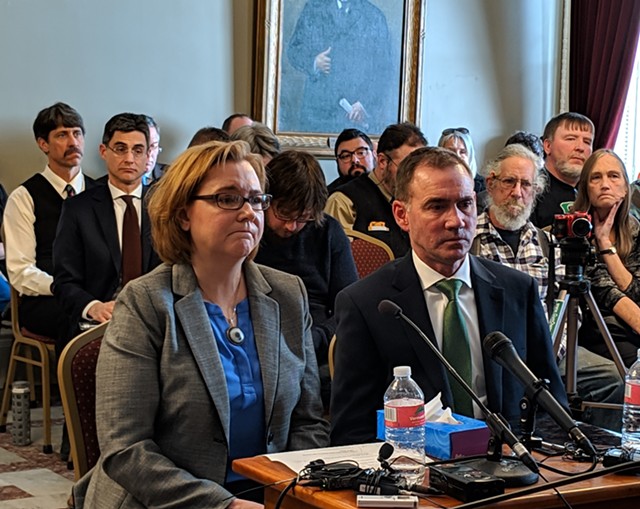
- File: Taylor Dobbs ©️ Seven Days
- Alyssa and Rob Black testifying before the Senate Judiciary Committee in February 2019
Rep. Cynthia Browning (D-Arlington), a thorn in the side to fellow Democrats, lost her reelection race. Browning drew the condemnation of many of her colleagues in March when she demanded that a quorum of the House attend an emergency session during the first wave of the coronavirus pandemic. Johnson soon stripped her of her committee assignment.
Browning subsequently renounced her party and ran as an independent in the two-member district. Fellow incumbent Rep. Kathleen James (D-Manchester) won reelection, while Democratic former legislator Seth Bongartz of Manchester bumped Browning out of contention.
Winooski voters, meanwhile, elected the state’s first openly transgender legislator, Democrat Taylor Small. She will join incumbent Rep. Hal Colston (D-Winooski) in representing the Onion City in the House. They defeated clean water advocate and former gubernatorial candidate James Ehlers, who also sought a seat in the Senate.
Winooski voters overwhelmingly approved a ballot item to allow noncitizen immigrants to vote in local elections, making it the second Vermont municipality to pass what’s known as “all-resident voting” in as many years.
The measure passed 2,479 to 999, according to unofficial results Tuesday night. The “yes” vote is to change the city’s charter, a decision that the state legislature and governor must now approve. Noncitizens would be able to vote in city and school elections; state and federal races would remain off-limits.
The vote is significant for Winooski, a city of 7,300 that boasts Vermont’s most diverse population and the state’s only majority-minority school district. Nearly 10 percent of residents there are not U.S. citizens.
Colin Flanders, Derek Brouwer, Kevin McCallum, Courtney Lamdin, Sasha Goldstein and Andrea Suozzo contributed reporting.
Related Stories
-
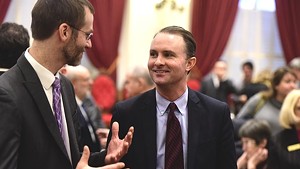
Attorney General T.J. Donovan Stepping Down to Take Corporate Gig
By Kevin McCallum June 10, 2022
-
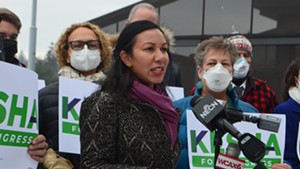
Vermont Sen. Kesha Ram Hinsdale Joins Race for U.S. House
By Sasha Goldstein January 13, 2022
-
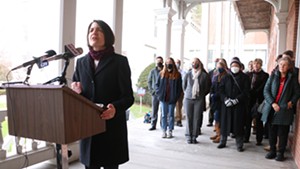
Balint Banks $125,000 on First Day of Congressional Campaign
By Kevin McCallum December 14, 2021
-

Will Leahy Run? As He Ponders, Three Potential Congressional Candidates Gear Up
By Sasha Goldstein November 1, 2021
-
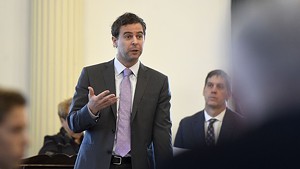
Tim Ashe Lands Job as Deputy State Auditor
By Kevin McCallum April 6, 2021
Speaking of...
-

Property Tax Relief Bill Sparks Partisan Feud
Apr 18, 2024 -

On the Beat: maari Drops 'Eyes Wide Shut,' and a Farewell Show for Pete Sutherland
Apr 17, 2024 -

Zoie Saunders, Gov. Scott’s Pick for Education Secretary, Faces Questions About Her Qualifications
Apr 10, 2024 -

Dick Mazza Steps Down From Vermont Senate
Apr 8, 2024 -

Gov. Scott Vetoes Flavored Tobacco Ban
Apr 3, 2024 - More »





Comments
Comments are closed.
From 2014-2020, Seven Days allowed readers to comment on all stories posted on our website. While we've appreciated the suggestions and insights, right now Seven Days is prioritizing our core mission — producing high-quality, responsible local journalism — over moderating online debates between readers.
To criticize, correct or praise our reporting, please send us a letter to the editor or send us a tip. We’ll check it out and report the results.
Online comments may return when we have better tech tools for managing them. Thanks for reading.